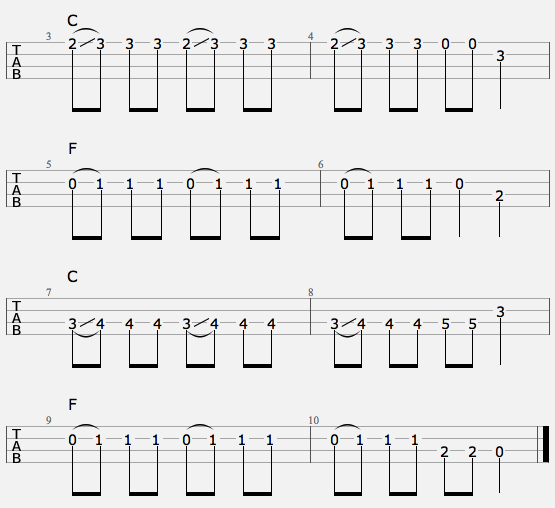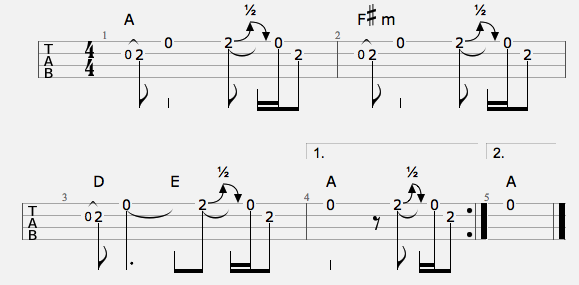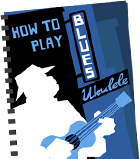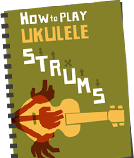I might not have thirty years of special effects experience, but I still want to tackle a few myths and misconceptions I see crop up now and again.
If you’ve got any you want to tackle, leave them in the comments.
There’s only one way to play each chord
The chords you see in chord books and at the top of sheet music are only one way of playing them. There are many other ways you can play them (known as inversions).
Uke chords are made up of three or four notes and any combination of those notes will give you the chord. You can play the notes higher up the neck. Or you can switch the string you play them on. It’s still the same chord.
For example, a C7 chord has the notes C, E, G, Bb. So you could play it 0001 (G-C-E-Bb) or 3433 (Bb-E-G-C).
There are good reasons to play a different inversion of a chord:
– It fits better with the chords around it.
– You’re playing with other ukulelists and want to stretch out the sound.
– You want to give it extra emphasis by playing higher up (or lower down) than the other chords in the sequence.
– It’s easier to play. Which brings us to.
Fmaj7 is impossible to play
I don’t know who decreed that all chord books would list Fmaj7 as 2413 but there are two possibilities:
1) They were so impossibly good at ukulele they forgot mortals can’t twist their fingers into a shodow puppet of Hogwarts.
2) They’ve never played an Fmaj7 on a ukulele in their life.
The vastly easier way of playing it is 5500. But you can usually get away with playing it exactly the same way as Am 2000.
Chord charts are “tabs”.
This one is infuriating to me. Not because I’m a grumpy pedant (although I definitely am). But because you want to know what you’re going to get. If the there’s no distinction it makes it harder to find what you’re looking for.
You have to play things the way they’re tabbed
It’s best to see tabs as suggestions. You can always play the same note on a different string, change a chord inversion, use a different strumming pattern. Or change things completely, call it an original composition and hope no one notices.
There’s a ukulele on I’m Yours
There no ukulele on Jason Mraz’s released version of I’m Yours (or any version I’ve ever heard by him for that matter).
The chugging instrument goes as low as the F# on the bottom E string of a guitar. Much too low even for a baritone ukulele.
The higher instrument is much closer to standard ukulele range (he’d only have to tune down a semitone to fit it on). But it sounds a lot like an electric, steel-strung instrument to me. There aren’t many steel-strung electric ukuleles around, even fewer in 2008. Seems very unlikely.
The entire world seems to be against me on this one. So if you have any evidence either way let me know.
UPDATES
Some more myths from the comments:
Any uke made of laminate will sound rubbish: Suggested by Lizzie. Cheaper ukuleles are made with cheap wood underneath and just a thin layer of nice wood on top for looks. Can you tell the difference between that method of construction and a solid wood ukulele? Here’s a – not entirely fair – test by Musicguymic. (The answers are here.)
Three Things I’ve Got Wrong
Of course, I’ve spread a few myths of my own. So, in the spirit of the meme that’s been knocking around the UK politblogs, here’s just three of them.
1. You can never have too many ukuleles
I was fully in the grip of UAS. Coming up with any excuse I could think of to buy another uke. But I finally hit rock bottom when I wasted far too much money on this ridiculous monstrosity.
Despite a huge collection of ukuleles, I only play two or three regularly. The rest collect dust. And now I wish I had fewer ukuleles.
2. You should start on a soprano
I’ve never been quite sure of the best advice to give when asked what size ukulele they should start with. So I went with soprano since that’s what most people mean when they think of a ukulele.
When I started, it took a lot of stumbling around before I settled on which ukes I preferred for which purposes. And I don’t really think there’s any shortcutting that process. So now I’d say try a few out if you can. Otherwise just buy whichever size takes your fancy. It’s not a big deal which you start out on. So long as it’s not a baritone.
3. I didn’t give Hawaiian culture enough repect
While I don’t agree with the, “Hipsters playing the ukulele is horrible cultural appropriation,” thing, I do think we should keep in mind we owe the instrument’s popularity to Hawaiians and should show them and their culture respect.
I wouldn’t tab Ukulele Lady now for that reason. It’s a song that turns Hawaiians into a caricature and reduces the language to nonsense.
And I’m going to try to combine points 3 and 1 by only buy ukuleles made in Hawaii from now on. I’m not sure if I’m capable of sticking to that though.
If you’ve got any myth corrections or something you’ve changed your mind on, leave it in the comments.






